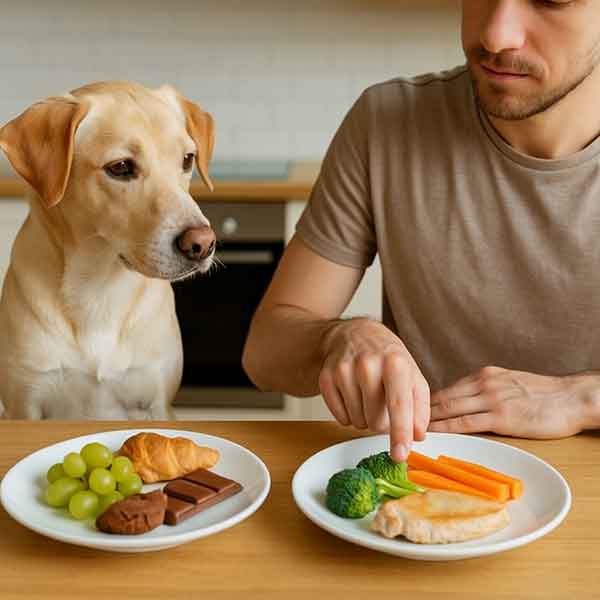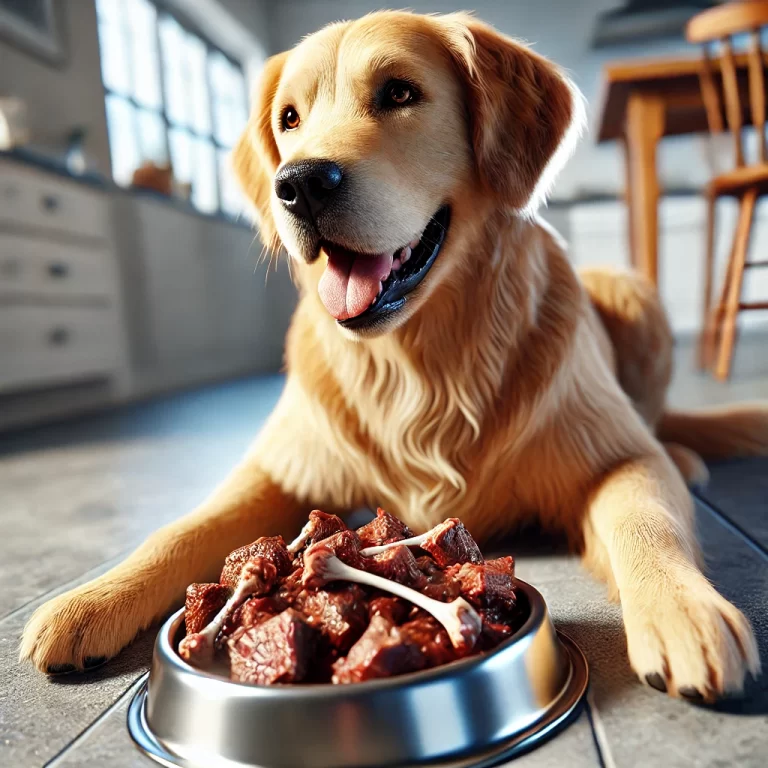Can Dogs Eat Human Food? | What’s Safe and What’s Not
Many dog owners find it hard to resist sharing a bite of their meal with their furry companions. But is it really safe? Can dogs eat human food? The answer isn’t a simple yes or no. Some human foods are perfectly safe—even beneficial—for dogs, while others can be harmful or even deadly.
This in-depth guide explores what human food dogs can eat, what to avoid, and how to offer treats safely. Whether you’re training your pup or spoiling your senior dog, understanding the right and wrong foods is key to their health and happiness.
Table of Contents
- Is Human Food Safe for Dogs?
- Benefits of Sharing Certain Human Foods
- Human Foods Dogs Can Eat
- Human Foods Dogs Should Never Eat
- Human Foods Dogs Can Eat in Moderation
- How to Feed Human Food to Dogs Safely
- FAQ
Is Human Food Safe for Dogs?
Some human foods are safe and even nutritious for dogs. Others can be dangerous due to ingredients dogs cannot properly digest or that are toxic to their system. Dogs have a different metabolism than humans, and what seems harmless to us can lead to digestive upset, poisoning, or even death in dogs.
In general:
- Plain, unseasoned, whole foods are the safest
- Processed foods with additives, salt, or sugar should be avoided
- Always research before offering new foods to your dog
Benefits of Sharing Certain Human Foods
When done correctly, sharing human food with your dog can have some health advantages. Benefits include:
- Providing variety and enrichment in their diet
- Offering natural sources of vitamins and minerals
- Helping picky eaters or dogs with appetite loss
- Serving as healthy training rewards
That said, always prioritize your dog’s nutritional needs, and don’t let human food replace a balanced commercial or vet-recommended dog diet.
Human Foods Dogs Can Eat
Here are common human foods that are generally safe for dogs to eat:
Fruits
- Apples (no seeds)
- Blueberries
- Bananas
- Watermelon (no rind/seeds)
- Strawberries
Vegetables
- Carrots
- Green beans
- Sweet potatoes (cooked)
- Cucumbers
- Peas
Proteins
- Chicken (cooked, no bones)
- Turkey (plain, boneless)
- Eggs (cooked)
- Salmon (cooked, no bones)
- Lean beef or pork (plain)
Other Safe Foods
- Oatmeal
- Plain rice
- Peanut butter (xylitol-free)
- Pumpkin (plain, canned or cooked)
- Plain yogurt (if lactose-tolerant)
Always introduce new foods in small amounts to see how your dog reacts.

Human Foods Dogs Should Never Eat
The following foods are toxic or dangerous to dogs and should be completely avoided:
- Chocolate – Contains theobromine, which is toxic to dogs
- Grapes & Raisins – Can cause kidney failure
- Onions, Garlic, Leeks – Damages red blood cells
- Xylitol – A sugar substitute found in gum, peanut butter, etc.; causes insulin spike and liver failure
- Macadamia nuts – Extremely toxic to dogs
- Alcohol – Even small amounts can be fatal
- Raw dough with yeast – Can expand in the stomach and produce ethanol
If your dog ingests any of these, contact your veterinarian or a pet poison control center immediately.
Human Foods Dogs Can Eat in Moderation
These foods aren’t toxic but should only be fed occasionally due to high fat, salt, or sugar content:
- Cheese – Small amounts if your dog is not lactose-intolerant
- Bread – Plain, non-sweetened types only
- Popcorn – Air-popped, no butter or salt
- White potatoes – Cooked only; avoid raw
- Peanut butter – Natural and unsweetened only
These foods can cause weight gain, pancreatitis, or stomach upset if overfed.
How to Feed Human Food to Dogs Safely
Tips for Feeding Human Food:
- Always feed in moderation
- Cut food into bite-sized pieces
- Avoid all seasonings, sauces, and oils
- Ensure all meats are cooked and boneless
- Introduce one new food at a time to monitor for allergies
Signs Your Dog Didn’t Tolerate a Food:
- Vomiting or diarrhea
- Itching or skin reactions
- Lethargy
- Loss of appetite
If your dog shows any of these symptoms, stop feeding the food and consult your vet.
FAQ
Can dogs eat table scraps?
While some table foods are safe, many are cooked with spices, fats, or toxic ingredients. It’s best to offer dog-safe human foods prepared separately.
Can I feed my dog a homemade diet?
Yes, but it must be balanced. Consult a veterinary nutritionist to ensure your dog receives all essential nutrients.
What fruits are toxic to dogs?
Grapes, raisins, cherries (with pits), and citrus in large quantities can be dangerous. Always research before offering fruit.
Can dogs eat cooked bones?
No. Cooked bones can splinter and cause choking or internal injury. Stick to raw, vet-approved bones if offering any.
Is milk safe for dogs?
Some dogs can tolerate small amounts, but many are lactose intolerant. Too much can lead to gas, diarrhea, or bloating.
Conclusion
So, can dogs eat human food? Yes, many human foods are safe and even beneficial for dogs when offered in moderation and properly prepared. However, others can be harmful or deadly, so it’s crucial to know which is which.
By understanding what’s safe, what’s not, and how to feed human food responsibly, you can add healthy variety to your dog’s diet and create enjoyable bonding experiences around food—without risking their health. When in doubt, always check with your veterinarian before sharing new foods with your furry friend.

